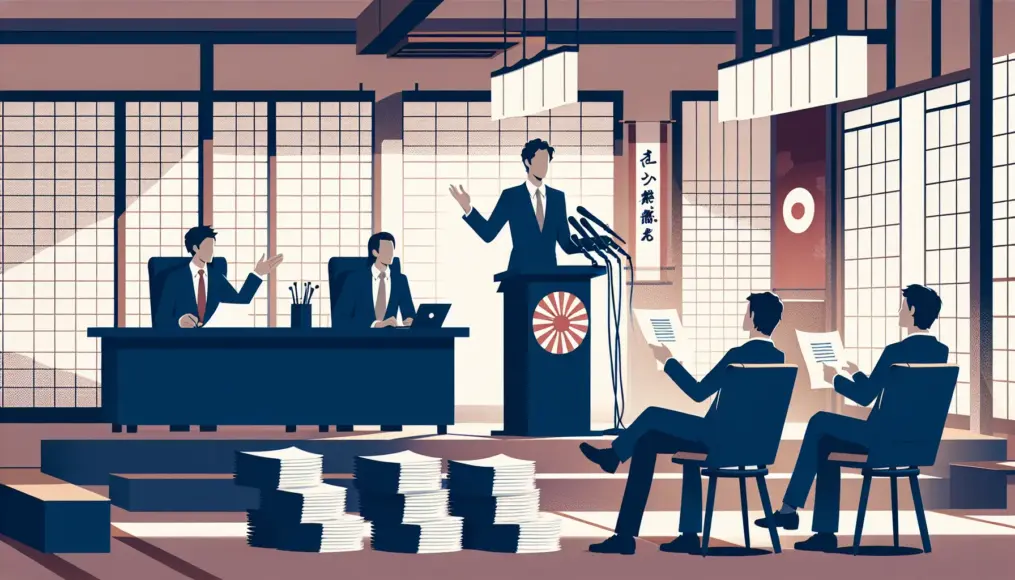Leader debates are a significant event in the world of politics. They serve as a platform for leaders to come together and share their policies and visions with the public. The behind-the-scenes drama surrounding these debates, including how they unfold and the impact they have, is fascinating. In this article, we’ll delve into the history and significance of leader debates, as well as insights from leaders themselves.
Preparing for a debate requires careful strategy and planning. The lessons learned from past successes and failures can greatly influence future political endeavors. How leaders convey their messages to the public and the type of communication they engage in during these debates are compelling aspects worth exploring.
To deepen your understanding of the evolving political landscape, we encourage you to read on.
- An overview of the history and significance of leader debates
- Behind-the-scenes stories about preparation and strategy for debates
- Lessons learned from past successes and failures
The History and Significance of Leader Debates
Leader debates serve as a crucial platform for political figures to showcase their ideas and policies to the public. These debates allow candidates to demonstrate their capabilities and leadership skills, often having a significant impact on election outcomes. Understanding the background of the first leader debate and how it has evolved over time can deepen our appreciation for its importance.
In this section, we will explore how the very first leader debate took place and examine its historical context, highlighting the critical role debates have played in politics. We’ll also consider the significance of the messages leaders convey to the public.
The First Leader Debate
The first leader debate marked a pivotal moment in changing the landscape of politics. Particularly with the rise of television, the influence of debates began to grow significantly. A notable example is the debates held in the United States during the 1960s, where the direct interaction between candidates dramatically altered viewers’ perceptions. Following this event, many countries adopted leader debates, establishing them as key fixtures in political activities.
Leader debates provide a venue for candidates to clarify their policies and build trust through dialogue with the public. Through these discussions, candidates’ leadership qualities and viewpoints are brought to the forefront, making them critical factors that can sway the direction of an election.
- Insight into the historical context of the first leader debate
- The impact of television on debates
- The importance of candidates engaging in dialogue with the public
The Political Significance of Debates
Debates are not merely platforms for presenting policies; they hold substantial political significance. By expressing their thoughts and encouraging dialogue with the public, leaders play a vital role in increasing political engagement. Additionally, debates help clarify the differences between candidates and the positions of various political parties.
In this way, leader debates are essential elements of electoral campaigns, serving as a catalyst for the public to contemplate political issues. The content of these debates can greatly influence future policy decisions and governance. As such, leaders must recognize the weight of their words in these discussions and engage thoughtfully.
For those looking to deepen their understanding of the importance of leader debates, we recommend the article “Exploring Japan’s House of Representatives Election System: Its History and Impact.” This piece offers a detailed examination of the evolution of the electoral system and its implications, allowing for a deeper exploration of the significance of debates in politics.
- Explanation of why debates hold political significance
- The role of dialogue with the public in enhancing political engagement
- Importance of clarifying differences between candidates
Preparing for Debates: Strategies for Success
Debate nights are crucial opportunities for politicians to connect with voters and showcase their policies. Therefore, thorough preparation before stepping onto the debate stage is essential. Leaders must effectively communicate their positions while also responding to opposing viewpoints. In this section, we will explore how to prepare for a debate and develop effective strategies.
During the preparation phase, analyzing the strengths and weaknesses of opponents is vital, as is clarifying one’s own stance. This groundwork allows candidates to speak confidently during the debate. Constructing a strategic argument goes beyond simple rebuttals; it involves understanding the opponent’s claims and leading the discussion into deeper territory.
Behind the Scenes of Debate Preparation
Preparing for a debate involves more than just gathering information. Candidates work with their teams to conduct simulations, creating environments that closely mimic the actual debate setting. This practice includes formulating responses to potential questions and rehearsing how to handle unexpected counterarguments. As a result, candidates can approach debate day with confidence.
Media training is also a crucial aspect of debate preparation. The ability to express oneself in front of a camera and choose the right words is key to making a strong impression. This training helps candidates appeal to viewers and communicate their policies more effectively.
- Importance of debate preparation
- The significance of simulation practice
- Necessity of media training
Constructing Strategic Arguments
Strategically building your arguments is essential for a successful debate. Start by clearly defining the main points of your discussion, and use these to counter your opponent’s claims. Effective rebuttals involve respecting opposing views while emphasizing your own position. Maintaining this balance instills a sense of trust in the audience.
Additionally, using specific examples during the debate to support your claims is crucial. This approach avoids abstract discussions and conveys a more concrete and persuasive message. How a leader articulates their thoughts during such a critical moment can significantly influence the perception of their capabilities.
For those interested in the intricacies of debate preparation, check out this article, “Exploring the Behind-the-Scenes of Election Campaigns: Traditions and Changes in Japanese Politics.” It delves into the history of election campaigns and the changes in modern times, providing insight into the various challenges politicians face.
- Importance of defining central discussion points
- Techniques for effective rebuttals
- Supporting claims with specific examples
The Impact of Debates
Party leader debates are more than just platforms for policy announcements; they serve as crucial opportunities for communication with the public. Leaders are expected to articulate their visions and values clearly while delivering important messages to the citizens. Given that debate content can significantly influence viewer perceptions and approval ratings, how these messages are conveyed becomes essential.
In this section, we will explore the messages that party leader debates send to the public and the political ramifications that unfold after the debates conclude. We’ll examine how leaders build trust with citizens and develop strategies as they approach the election.
How to Convey Messages to the Public
Politicians have various approaches to conveying messages to the public. During party leader debates, candidates are not only required to present their policies but also to offer solutions to issues that the public faces. Utilizing emotional storytelling and incorporating specific examples can be particularly effective in this process.
Additionally, it is crucial for leaders to demonstrate a genuine willingness to listen and respond to opposing viewpoints. This fosters a sense of trust among viewers and strengthens their positions throughout the debate. By valuing dialogue with the public and seeking to resonate with their concerns, candidates can create opportunities to broaden their support.
- Approaches for politicians to communicate with the public
- The importance of emotional storytelling
- The necessity of sincerely addressing opposing views
Political Implications After the Debate
Once party leader debates conclude, their content can greatly impact the electoral landscape. Statements and exchanges during the debate are often covered by the media, reaching a wide audience. As a result, candidates’ perceptions and approval ratings frequently shift. Candidates who perform well in debates tend to see an increase in support afterward.
Moreover, the outcomes of the debates clarify the policies and positions of each party, providing voters with essential information for their choices. This enables constituents to make more informed decisions, which often directly affects election results. The influence of debates is a pivotal factor that can sway the entire election campaign.
For those looking to deepen their understanding of the influence of party leader debates, I recommend checking out this article that thoroughly explains the electoral system: “Understanding the Presidential Election System: Its Background and Impact.” By exploring the background and implications of the electoral system, you can gain further insights into how politics intersects with citizens’ lives.
- The impact of post-debate content on the electoral campaign
- The relationship between candidate performance and fluctuations in approval ratings
- The importance of providing materials for voters to make informed decisions
Learning from Past Debates
Party leader debates serve as a critical platform for showcasing leaders’ abilities and policies to the public. By reflecting on past debates, we can identify the factors that contributed to their success and the lessons learned from failures. These insights are incredibly valuable for shaping strategies and preparations for future debates.
In this section, we will explore examples of successful debates, the elements that made them effective, and what can be learned from debates that fell short. By examining how candidates effectively communicated their messages and identifying points of failure, we can glean important insights for upcoming discussions.
Characteristics of Successful Debates
Successful party leader debates often feature candidates who clearly convey their vision and resonate with the audience. An effective approach includes sharing emotionally compelling stories and real-life examples to strengthen their arguments. Additionally, respectfully countering opposing views can enhance trust and credibility with viewers.
Preparation plays a significant role in success as well. Simulation exercises and media training help candidates approach debates with confidence, allowing for a more authentic performance that leaves a positive impression on the audience. When these factors align, they contribute to a successful debate experience.
- Characteristics of successful debates
- Importance of emotionally engaging stories
- The role of simulations and media training during preparation
Learning from Failures
Conversely, unsuccessful debates often share common pitfalls. A frequent issue is inadequate preparation or disregarding the opposing viewpoint, leading to insufficient discussions. When candidates become overly fixated on their own arguments and fail to listen to others, it can result in a loss of trust from viewers.
Additionally, if a candidate’s message is unclear or lacks focus, the audience may become confused, resulting in a lack of support. By learning from these missteps, candidates can identify areas for improvement and devise more effective strategies for future debates.
If you’re interested in this topic, you might also enjoy the article “Exploring the Cultural Impact of Election Campaigns and Political Activities.” This blog delves into how election campaigns and political activities shape Japanese culture, offering fresh perspectives on conveying political messages and the importance of civic engagement.
- Common factors in unsuccessful debates
- Risks of inadequate preparation and dismissing opposing views
- Impact of unclear messaging
Conclusion
Leader debates serve as crucial platforms for conveying policies and visions to the public, directly influencing election outcomes. To succeed in these debates, thorough preparation is essential, and employing emotionally resonant stories along with concrete examples can be particularly effective. Additionally, engaging in respectful discourse, even when addressing opposing viewpoints, helps to establish trust with the audience.
Moreover, there’s a wealth of knowledge to be gained from analyzing past debates. By identifying the factors that led to failures, candidates can pinpoint areas for improvement in future discussions. Through these experiences, candidates are expected to clarify their messages and build strong relationships with the electorate.
- Leader debates are vital opportunities for candidates to communicate their policies to the public.
- Success requires preparation, storytelling, and respect for opponents.
- Learning from past successes and failures is key to improvement for future debates.
As we move forward, leader debates will undoubtedly play an increasingly important role. We’d love to hear your thoughts and feedback!



Comment